IMPACT's Presence at the International Events

Courtesy of The Festival Academy
June 2021
IMPACT continues its partnership with the Festival Academy, a global community of 801 festival managers from 95 countries, which offers numerous leadership and capacity building programs for the festival managers and carries the conversation beyond the festivals to include the cultural dimensions of the challenges that the world is facing.
On June 19, 2021, IMPACT Leadership Circle member Carmen Olaechea participated as a panelist at the Festival Academy's "Atelier Düsseldorf/Theater der Welt 2021," to speak about the sustainability of festivals in the light of a paradigm shift that humanity is experiencing. (See the article in this newsletter on "Culture as Sustainability.") Among other issues, the panel, called, "The sustainability of festivals in a time of COVID-19," addressed the following:
- How has COVID-19 impacted the funding of festivals?
- What new business and partnership models are emerging for the sustainability of festivals?
- What are the key challenges to monetise online festivals and distribution of the arts, and what are some of most successful models to have emerged in the last 18 months?
- How has COVID-19 impacted environmental sustainability? Are there new models being explored on that level?
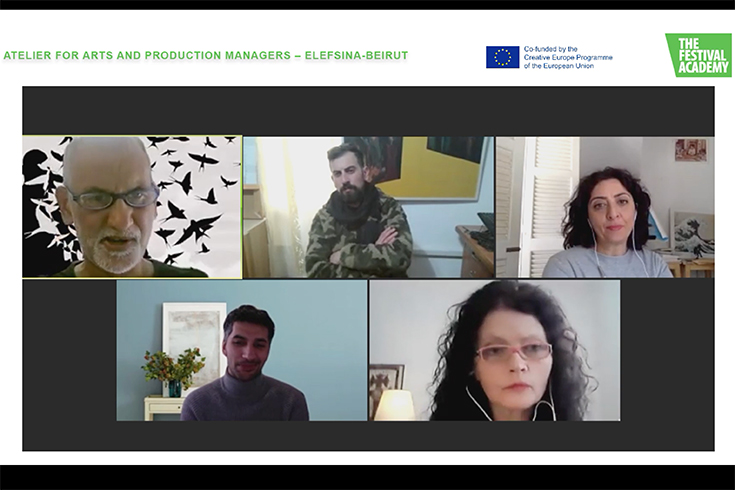
Ellada Evangelou and Dijana Milošević speaking at the Academy’s Virtual Atelier
Photo Credit: Photo courtesy of The Festival Academy
March 2021
Inaugurating a new dialogue is an exciting and substantial process, especially when it takes place between entities with aligned ethical and organizational goals: to bring together practitioners from around the world, to support their artistic processes and to enable them to exchange views and opinions, creating an environment of growth and nurturing. Such is the discussion that has started between IMPACT and The Festival Academy, with the participation of Dijana Milošević and Ellada Evangelou (IMPACT) in the Academy's Atelier entitled, "- the arts, the artist and the audience." The Atelier is a meeting of arts festival practitioners from around the world, a five-day training during which the group asks why we are doing what we are doing, for whom and with whom. It also addresses "how" we do things, which relates more to the production side of a festival or art event.
The Academy had selected 26 arts and production managers from Albania, Bulgaria, Cyprus, Greece, Jordan, Lebanon, Macedonia, Morocco, Palestine, Serbia, Tunisia and Turkey, to take part in this unique training programme.
IMPACT's Dijana Milošević and Ellada Evangelou, both of whom are festival organizers with the Dah Teater (Belgrade, Sebia) and Buffer Fringe Performing Arts Festival (Nicosia, Cyprus) respectively, were invited as speakers in a peer-to-peer learning process, with colleagues working in different contexts and disciplines. This allowed for the sharing of information about IMPACT, as well as personal experiences of organizing festivals in post-conflict spaces, with the added stress of the COVID pandemic, and allowed for mutual learning and exchange, during in-depth discussions about the topics that concerned participants.
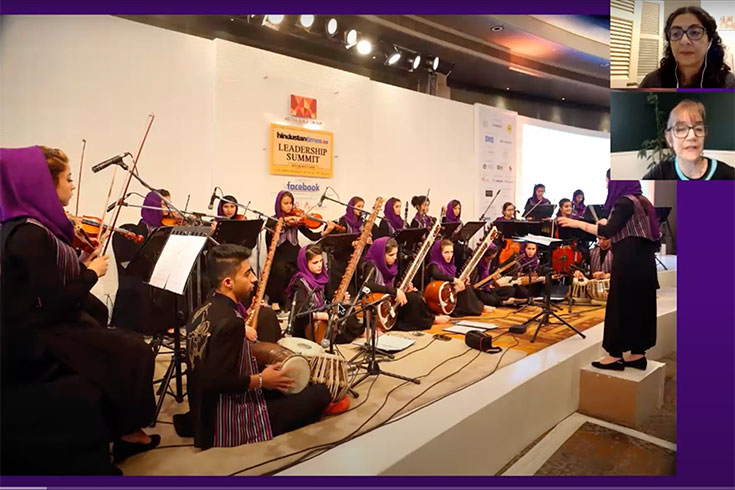
Ellada Evangelou and Toni Shapiro-Phim at virtual IPRA Conference
Photo Credit: IPRA
January 2021
Toni Shapiro-Phim and Ellada Evangelou speak about the "Thinking Partners" initiative — an innovative partnership model between IMPACT and Buffer Fringe Festival (Cyprus) — at IPRA's 2021 28th biennial conference.
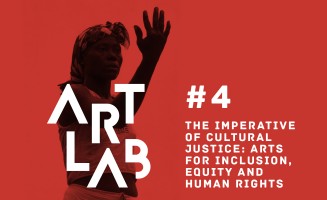
Photo Credit: UNESCO
Dec. 10, 2020
Virtual event: "The Imperative of Cultural Justice: Arts for inclusion, equity, and human rights"
The fourth Art-Lab event took place on the occasion of Human Rights Day on Dec. 10, 2020. The objective of the "Art-Lab for Human Rights and Dialogue," initiated by the Social and Human Sciences sector at UNESCO, is to mainstream the arts across humanitarian and development programmes. It targets cultural operators, policymakers and humanitarian actors to involve the most vulnerable in arts practice, for the advancement of human rights and dignity.
- Welcoming address by Gabriela Ramos, Assistant Director-General for the Social and Human Sciences of UNESCO — Art-Lab and the repositioning of the ones left behind in the quest for the SDGs [from 07:28-16:33]
- Reading of the findings and recommendations issued from the Art-Lab Literature Review by Alison Phipps, Professor of Languages and Intercultural Studies UNESCO Chair in Refugee Integration through Languages and the Arts, with response by Tawona Sithole, both at University of Glasgow, U.K. [from 35:52-47:56]
- Screening of the Because of the War film trailer
- How practicing arts can transform lives: Interview with Fatu Gayflor, award-winning Liberian singer and cultural activist, and Toni Shapiro-Phim, filmmaker of Because of the War, assistant director of Brandeis University’s Program in Peacebuilding and the Arts (USA), IMPACT Leadership Circle member [from 56:46-01:07:30]
- Towards an assessment framework for arts and cultural work in support of cultural justice and human rights, moderated by Cynthia Cohen, Director of the Program in Peacebuilding and the Arts, Brandeis University, Massachusetts, USA, and IMPACT Leadership Circle member [from 1:46:53- 2:28:06]
- The permeable membrane between art and society: a framework for documentation, assessment and evaluation, based on the Brandeis/Theatre Without Borders collaboration Acting Together, by Cynthia Cohen
- Key ethical parameters for engaging vulnerable communities in arts- and culture-based initiatives, arising fromArt-Lab research and indigenous epistemologies, by Polly Walker, Director of the Baker Institute for Peace and Conflict Studies and Elizabeth Evans Baker Professor for Peace and Conflict Studies, Juniata College, Huntingdon, PA, USA; Chair of the Indigenous Education Institute, IMPACT Leadership Circle member
- The British Council's cultural relations approach to sustainable development by Rosanna Lewis, Culture and Development global lead, British Council, Brussels, Belgium
- How to assess the progress of human rights through artistic interventions with refugee populations? by Iman Aoun, Artistic Director, Ashtar Theatre, Palestine
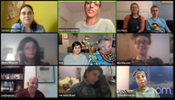
Photo Credit: Buffer Fringe
Virtual Discussion: The New Faces of Displacement — Artistic Praxis and a Contested Festival in the Middle of a Pandemic
November 2020
Cyprus
Artists from this year's Buffer Fringe, thinking partners and researchers from the IMPACT community explore questions displacement during the COVID-19 pandemic that requires non-displacement.
Displacement of any form implies a disruption of our understanding of time and space. How does the required immobility of our times challenge personal artistic practices and cultural structures? How does an acclaimed festival as the Buffer Fringe relocate itself during these times of containment? How does this time make us think about the role of artists and art?
- Moderators: Maria Varnakkidou and Lee Perlman (IMPACT)
- Speakers:
- Carmen Olaechea — Thinking Partner (IMPACT)
- Dijana Milosevic — Thinking Partner (IMPACT)
- Germaine Ingram — (IMPACT)
- Nurtane Karagil — Artist
- Kat Kats and Bryce Ives — Artists
- Erdoğan Kavaz — Thinking Partner
- Rita Marcalo and the Dispersed Dance Company — Artists
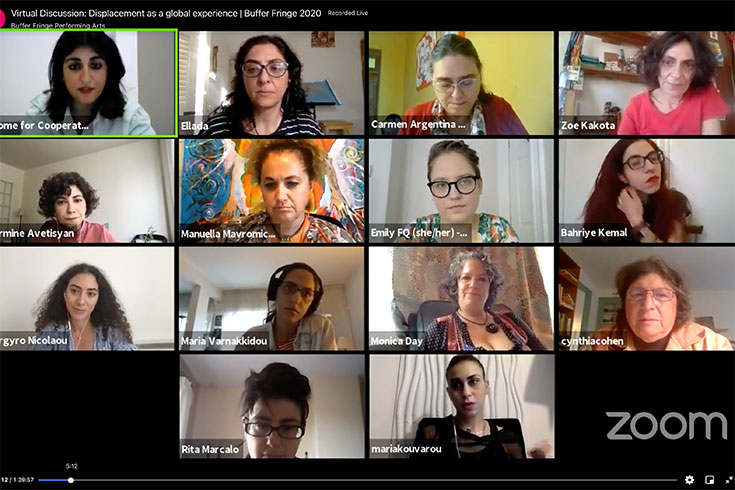
Photo Credit: Buffer Fringe
Virtual Discussion: Displacement as a Global Experience
October 2020
Cyprus
Displacement as a global experience was the topic of the discussion on Oct. 21, focusing on case studies from arts which are related to displacement, with examples from scholars and practitioners working in conflict regions. Clips from the Acting Together on the World Stage documentary, Argyro Nicolaou's History Lesson and Armine Avetisyan's Haven't We Shared Much Salt and Bread? documentaries were screened and discussed by the participants. Each clip from Acting Together on the World Stage offers a view on creative artists and on peacebuilders working in conflict regions, History Lesson on the different meanings of displacement and Haven't We Shared Much Salt and Bread? on the challenges that a group of Armenian and Turkish women are facing while cooking traditional recipes together in the kitchen. These documentaries lead the participants to think critically about displacement and peacebuilding.
Serbia
October 2020
DAH Theatre hosted a session featuring IMPACT at the Arts and Human Rights Festival. Cynthia Cohen, Dijana Milosevic, Polly Walker — members of the IMPACT Leadership Circle and artist Claudia Bernardi talk about the intersection of arts, culture and conflict transformation.
September 2020

It was an honour to meet such a diversity of teaching artists working in community-based and school settings deeply enquiring about their own and each other's practice. I was privileged to host a lunchtime Collective Gathering each day of the conference called the IMPACT Dialogues where we shared our ITAC5 learnings and unlearnings through the lens of peacebuilding. It was a place for dialogue about the ways teaching artists are transforming conflict, decolonising, and unlearning in their practice.
During one of our sessions, we engaged creativity with the inquiry, What is Peacebuilding Teaching Artistry?
Based in our own online spaces of connection, we drew body outlines and wrote or drew three words or images that we saw as being in the head, in the heart and in the hands of a Peacebuilding Teaching Artist. We shared and discussed these. (See a selection of participants' sharings in the drawing above.) Then we closed our time together by sharing what grounds us on the left foot, and what's next on the right.We look forward to continuing connections between IMPACT and ITAC for, as you can see, what we enable with our heads, our hearts and are hands have great synergy.
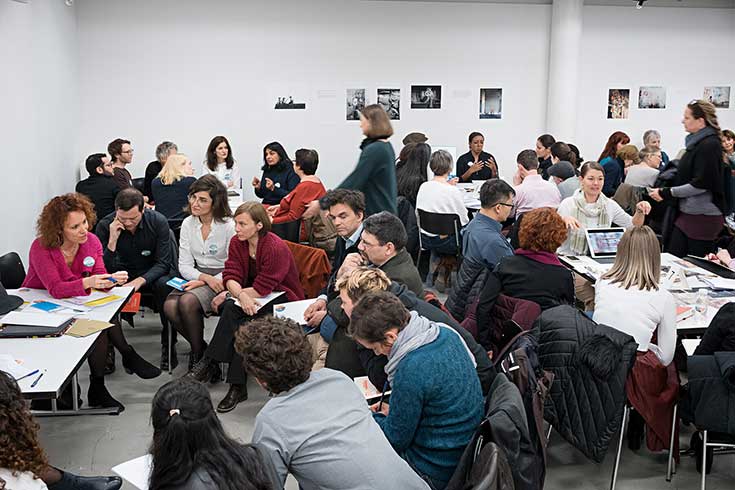
Art at Risk: Creative Work in Challenging Contexts Conference 2020
Photo Credit: Evan Ruetsch
Geneva and Zurich
February 2020
Just before the pandemic completely constrained travel and gatherings, I enjoyed the privilege of attending two important convenings in Switzerland. In both cases, I was able to share IMPACT's insights, vision and questions with key players in the arts, culture and conflict transformation ecosystem, to invite people to join our upcoming Learning Exchange, and to listen as people from many sectors of the ecosystem shared accomplishments and challenges.
Art-Lab Design Thinking Jam, Geneva, Feb. 26, 2020
In a unique inter-agency collaboration, the UN Educational, Scientific and Cultural Organization (UNESCO), the Office of the High Commissioner on Human Rights (OHCHR), and the UN Refugee Agency (UNHCR) hosted an Art-Lab Design Thinking Jam in Geneva on Feb. 26. Participants included engaged artists, experts and researchers, cultural operators and activists working in the field, leaders of cultural foundations, and representatives of UN agencies and intercultural organizations. The agenda focused on this question: "Why are arts and culture, whose powers are transformative for people in precarious situations, not used more often?" IMPACT will be an active player in follow-up activities. (A PDF of Cynthia Cohen's overview of this event may be requested by completing the online publication request form.)
Art at Risk, Zurich, Feb. 27-29, 2020
The Art at Risk: Creative Work in Challenging Contexts conference was planned and organized by artasfoundation with support of the Culture and Development Section of the Swiss Agency for Development and Cooperation and the Zurich University of the Arts. (Artasfoundation initiates arts projects, accompanies their realization and investigates how art can promote conflict mediation and peace-building.) The gathering brought together 180 people from diverse segments of the arts, culture and conflict transformation ecosystem from 42 countries. View extensive documentation, including videos of three plenary sessions.
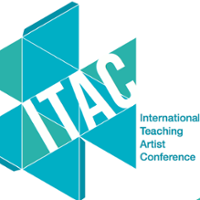
July 30, 2019
Hosted by the International Teaching Artist Conference (ITAC)
During the July 30 Think Tank discussion hosted by the International Teaching Artist Conference (ITAC) on the emerging field of Art, Culture and Conflict Transformation (ACCT), IMPACT colleagues Cynthia Cohen, Mary Ann Hunter from Tasmania, and Carmen Olaechea from Argentina explored the emerging field of ACCT and intersections of education, arts and peacebuilding.